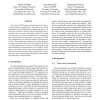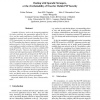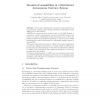195 search results - page 18 / 39 » Autonomic and Trusted Computing Paradigms |
21
Voted
ICDCSW
2006
IEEE
14 years 1 months ago
2006
IEEE
Peer-to-peer (P2P) systems are based upon the cooperative interactions of member peers. Typically, peers are both autonomous and self-interested, meaning that there is no hierarch...
DEXAW
2007
IEEE
13 years 11 months ago
2007
IEEE
A number of factors, such as the increasing popularity of wireless networks, the opportunities offered by 3G services, and the rapid proliferation of mobile devices, have stimulat...
ECAI
2006
Springer
13 years 11 months ago
2006
Springer
Existing approaches to knowledge representation and reasoning in the context of open systems either deal with "objective" knowledge or with beliefs. In contrast, there ha...
AP2PC
2005
Springer
14 years 1 months ago
2005
Springer
Peer-to-peer complementary currencies can be powerful tools for promoting exchanges and building sustainable relationships among selfish peers on the Internet. i-WAT[10] is a prop...
PERCOM
2006
ACM
14 years 7 months ago
2006
ACM
Pervasive devices interacting in open and dynamic spaces with each others require a mechanism that allows them acting autonomously in a secure way and protecting their resources. ...



